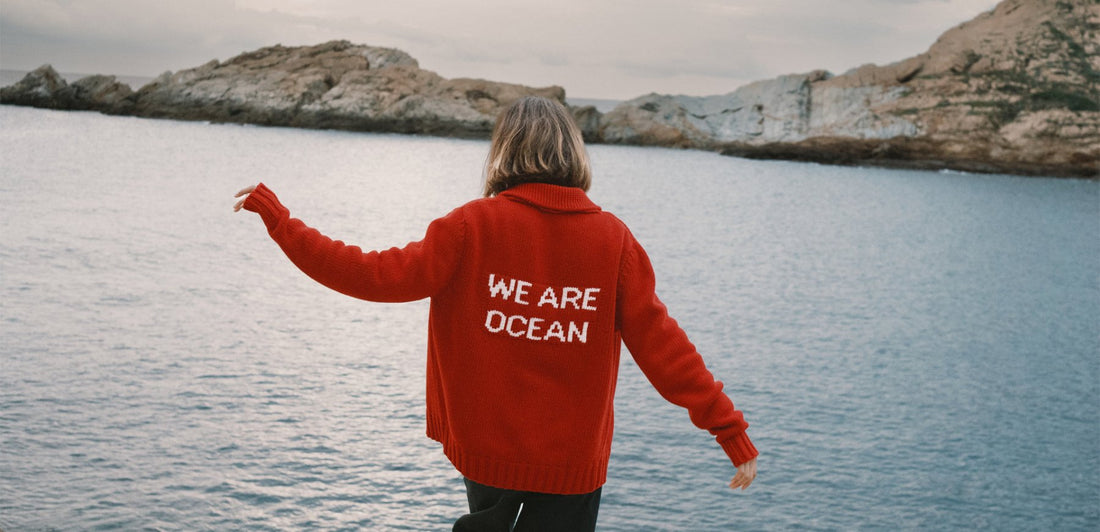New KM0 Limited Edition
We began the new year by taking a camera to witness exactly how our upcoming Limited Edition Imjado knit is made. Our shooting team didn't have to go far, because the Imjado’s stunning “WE ARE OCEAN” motif was brought to life just a few short kilometres from our Barcelona HQ, by the good people at Chic Barcelona.
Chic’s founder and CEO Santi León Surroca has worked for over 30-years with his team of local artisans to create what they call a 360° knitwear service. This means they are so much more than just a factory. Aside from guiding brands through the complex stages of creating sustainable knitwear, they are active in local universities and even run their own course for budding fashion designers.
It was this super localised approach and dedication to sustainability that put Chic on our radar and had us reach out to them. When they told us that they had high-quality deadstock yarn (left behind by another brand) we jumped at the chance to collaborate with them.
“A localised approach and dedication to sustainability put Chic on our radar.”
As is true of all our Limited Edition collections, we only ever use the deadstock yarn or fabric that’s available to us, meaning it would often be impossible to replicate a piece even if we tried. That makes the Imjado particularly unique, because it is also designed and manufactured within a tiny radius, right here in Barcelona province.

Building a Network of Ethical, Local Suppliers
Chic are far from the only local supplier we work with on Limited Edition collections and regular collections. Another we partner with is a cooperative called John Fil. Together we make the incredible Lachea sustainable knit, which has become a firm favourite with our ocean community and is also made from 100% deadstock yarn.

Working with suppliers that have adopted progressive governance structures such as worker or stakeholder ownership is just another way of ensuring that we only work with the most sustainable and ethical partners. It’s a key part of what enabled us to become B Corp Certified in 2022.
Fewer Collections - 4 for 2024
There’s been a huge amount going on at TWOTHIRDS HQ in recent months. We launched our maiden Barcelona pop-up shop and also expanded into wholesale, so that our ocean community’s favourite shops can begin stocking the TWOTHIRDS garments their customers have been crying out for (literally according to some retailers).
The other big change has been to reduce the number of collections we’re launching in 2024, from six to just four. This reduction in collections will enable our designers to focus like never before on creating clothing that’s made to last a lifetime, as well as giving us time to improve the sustainability of our supply chain processes and our selection of cutting-edge eco fabrics.
“This reduction in collections will enable our designers to focus on creating clothing that’s made to last a lifetime…”
Why Less Collections is a Big Deal
One of the major critiques of fast fashion and on-demand business models is that they are designed to condition people into thinking they must buy new clothing at a frantic rate, just so they as individuals can remain relevant and on-trend. The proliferation of fashion collections has therefore grown to astronomic levels, with dire consequences for the environment.
Zara was once at the vanguard of cutting “lead times” (the time it takes to design, produce, and get a product to market) with reported lead times of as little as two weeks as far back as 2012. Fast forward to the present day and that benchmark has been reduced further still by ultra fast fashion giants Shein.
“The average Shein customer in the US spends $100+ per month on low quality clothing. We don’t think it’s unreasonable to instead spend $100+ every few months on one piece of sustainable clothing that’s made to last a lifetime.”
The upshot of this race to the bottom is that fast fashion brands regularly release 50+ collections every year, with Shein releasing even more – known as “micro production runs”. The problem with this approach is that it applies huge pressure on suppliers, who then treat their workers badly. There is also little time to consider the environmental impacts of such large scale production and consumption.
The solution to all this, of course, is to produce a sensible amount of collections and products per year, in harmony with nature’s four seasons. That’s how we came to settle on 4 for 2024, so we can concentrate on what truly matters: ethical labour standards for all workers and the promotion of conscious consumerism that cares for the ocean.

This decision to cut yearly collections is also in line with us backing the #ruleof5 campaign, which states that western countries could fall in line with Paris Climate Agreement targets if consumers agreed to only buy 5 new items of clothing per year. With the average Shein customer spending over $100 per month on cheap, low quality clothing, we don’t think it’s unreasonable to spend $100 or $200 every two or three months on a piece of sustainable clothing that’s made to last a lifetime.









